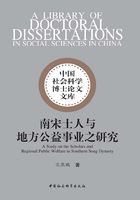
Abstract
The scholars in Jiangnan had embarked on the process of centralization since the Tang Dynasty,who gradually left their original place and exited the stage of history in the wake of warring Five Dynasties of Late Tang Dynasty. Plenty of scholars migrated to southern China from north between An Shi Rebellion and Five Dynasties. In late Tang Dynasty the economy in the southern China was obviously more prosperous than the north,while culturally the north was on a par with the south with a slight competitive advantage in the south. The arrival of those northern scholars had a significant impact on the changes in the culture of the southern China. The local forces began to rise in Jiangnan during the warring years of the late Tang Dynasty.
The Imperial Examination System of China contributed to social mobility in the social ladder,and a class that engaged in imperial examination as pivotal business was formed in the middle periods of Tang Dynasty,which even reached the Jiangnan region. The Northern Song Dynasty developed the imperial examination system and promoted official education at the local levels,thus contributing to the expansion of the scholars. Following the Jingkang Incident,residents in the northern China migrated to the south on an enormous scale,which also helped to increase the number of scholars in the South. The arrival of Northern scholars,the process of localization and the consistent development of imperial examination system boosted the number of scholars in the Southern Song Dynasty. This is thanks to the popularity of public and private education at the local levels as well as the advances of printing and publishing technologies. The self-identity of scholars was consistent,and the formation patterns of them became similar. There was even a basic hierarchy in this class.
As a crucial class in the Southern Song Dynasty,the advantage of their social status and worship from the affluent,the respect and interaction between local officers and the scholars,in addition to those factors,the scholars interacted frequently with government officers and wealthy people during public charity activities,thereby gaining the power of culture to some extent. The areas controlled by this power ranged from family to clan,even transcended clan to the neighborhood,eventually entered the public sector. Local officers had to face this public sector in the first place,where the scholars interacted with government officers.
The scholars participated in a wide range of public charity activities,such as economic aid,includingfood aid,financial aid and tax;public infrastructure such as the construction of bridges and water conservancy projects;cultural facilities like building public schools and temples. The scholars took an active part in all the activities. They participated in those activities in two forms:one was to donate money,and another was to admonish others to participate.
The public charity in the Southern Song Dynasty was mainly led by the local officers. The scholars only contributed their forces without controlling these events. Influenced by the scholars,the wealthy usually followed suit and devoted their power to public charity. Particularly in the public charity attended by Buddhists,the scholars also joined them.
In the long term,from Tang Dynasty to Ming and Qing Dynasty,there were some evident changes in the local forces that participated in public charity except the religious forces in the Yangtse River region and its south. They were common people and landlords in the latter periods of Tang Dynasty;the scholars and the affluent in the Southern Song Dynasty;the gentlemen and the affluent in the Ming and Qing Dynasty. Northern Song Dynasty and Yuan Dynasty were the transitional periods.
The scholars in the Southern Song Dynasty laid a solid foundation in the implementation mode of how the educated(the scholars and gentlemen)participated in the local charity along with the government for eight hundred years. However,there were apparent uncertainties in the implementation and the lack of systematic design about public charity. Therefore,from Southern Song Dynasty to Ming and Qing Dynasty,as the administrative capacity was determined by local economy,two modes-government in people out and government out people in alternated in terms of pubic charity in ancient times.
Keywords:Southern Song Dynasty;Scholars;the power of culture;public charity